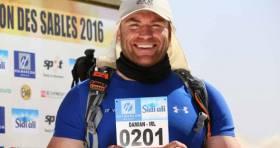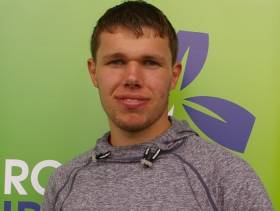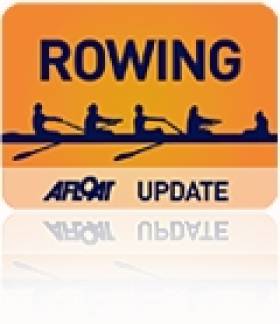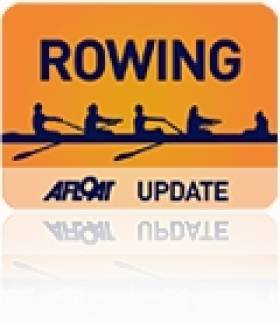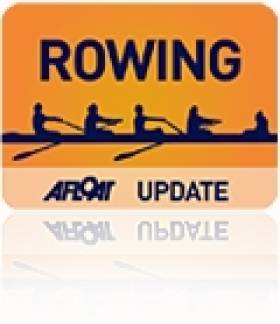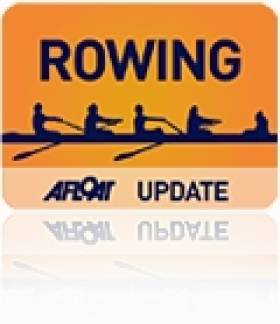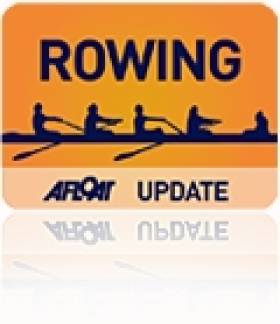Displaying items by tag: Indoor
Browne Prepares for Atlantic Row with Indoor Feat
#Rowing: Damian Browne set a remarkable time of 1:16.2 for 500 metres at the Provinces Indoor Rowing championships at the University of Limerick on Saturday. The big Galway man, who will row the Atlantic starting in December, finished second in the men’s open category. Colin Burke of Auriel Kensington won this with 1.4 seconds to spare over Browne.
Provinces Indoor Rowing Championships, Limerick,Saturday
Men, Open: 1 Colin Burke (Auriel-Kensington, London) 6:12.9, 2 Damian Browne 6:14.3, 3 Ciaran Brady (Offaly) 6:25.7. 500m: Browne 1:16.2
Junior 18 2000: Mark Ryder (Col Iognaid) 6:29.8.Jun 18 500: James McCarthy (CIT) 1:22.3
M J16 2000: Darragh Gallivan (CRCC) 6:52.8. Men, 30-39: John Whooley (Skib) 6:23.2.
M 40-49: Fintan Gilsenan (Castletownbere RC) 6:26.8.
Women, Open: B Larsen (Garda) 7:06.0. Jun 18 : Caoileann Nic Dhonncha (Col Iognaid) 7:34.1 Jun 16: Roisin O’Connor (Castleconnell BC) 7:34.7.
W 40-49: Fiona McKeown (Castleconnell BC) 7:23.0
Pararowing
MLTA: Kevin Wall (Clonmel) 6:51.9.
WLTA: Sarah McLoughlin (Univ of Limerick) 8:07.
McKeown Crashes Through Six Minutes to Set New Irish Record
#Rowing: Paul O’Donovan set a new personal best – by just .1 of a second - and was the top lightweight at the Irish Indoor Rowing Championships today. The outstanding peformance of the day at the University of Limerick belonged, however, to heavyweight oarsman Sam McKeown. The Queen’s University oarsman was by far the fastest on the day, with a time of five minutes 55 seconds. This was the second occasion on which he had broken six minutes (he had covered the 2,000 metres in 5:59 in November) and he looked in control at the finish, shouting “Go Queen’s!”
Sanita Puspure was the fastest woman, clocking six minutes 40 seconds with a steady peformance. Her nearest rival was Monika Dukarska – 6:52.6 was a personal best for the Killorglin woman.
Ross Corrigan from Enniksillen Royal College (formerly Portora) was the fastest junior man – of 125 – and Hannah Scott of Bann took the honours amongst junior women.
In the under-23 men’s competition, another win for Daire Lynch confirmed his strong transition from junior ranks; UCD man Shane O’Connell, whose star has also been on the rise, won the under-23 lightweight grade in a good battle with Jake McCarthy and Fintan McCarthy.
Emily Hegarty of Skibbereen was the top woman at under-23 level. Her nearest rival was Eimear Lambe, who pipped her elder sister, Claire, by half a second. The Ireland Olympian who is now at Cambridge University competed as a heavyweight as she prepares for the Boat Race.
Competitors had to leave the venue late in the programme after a fire alarm. They were able to return to finish events.
Irish Indoor Rowing Championships, University of Limerick, Saturday (Selected Results):
Men – Open: 1 S McKeown 5 min 55.0 sec, 2 E O’Connor 6:02.7, 3 T Oliver 6:03.9. Lightweight Open: 1 P O’Donovan 6:07.4, 2 G O’Donovan 6:14.2, 3 M O’Donovan 6:19.0, 4 S O’Driscoll 6:21.1. Under-23: D Lynch 6:10.0. Lightweight Under-23: S O’Connell 6:21.3. Junior 18: R Corrigan 6:21.3. Jun 16: M Gallagher 6:38.6.
Women – Open: 1 S Puspure 6:40.0, 2 M Dukarska 6:52.6, 3 B Larsen 7:02.5, 4 C Lambe 7:11.4. Lwt: D Walsh 7:13.1. Under-23: E Hegarty 6:57.5; Lwt U-23: E McGiff 7:38.6. Jun 18: H Scott 7:05.7. Jun 16: Z McCutcheon 7:18.2.
Rio Olympians Sign Up for Irish Indoor Rowing Championships
#Rowing: The entry for the Irish Indoor Rowing Championships has both quantity and quality, with Irish rowers who are set to compete at the Olympic Games in the mix. Gary O’Donovan will compete in lightweight class and Paul O’Donovan in the under-23 lightweight class.
Claire Lambe, who partnered Sinéad Jennings in the Ireland lightweight women’s double crew which qualified the boat for Rio, is also entered. Jennings may do a Wattbike test.
Among the heavyweight men, Philip Doyle, Sam McKeown and Dave Neale will be among those competing to set the top mark, while Sanita Puspure, an Olympian in 2012, should be the fastest woman.
The Championships have a record entry and will be held in Limerick on January 23rd.
Lambe and O'Donovans Set New Personal Best Times in Indoor Tests
#Indoor Rowing: Claire Lambe excelled among a group of lightweight rowers who set personal best times in ergometer (rowing machine) tests at the National Rowing Centre in Cork. Gary O’Donovan, Mark O’Donovan and Shane O’Driscoll all set new best times. Paul O’Donovan did his test in Dublin and also broke new ground. Heavyweight rower Aifric Keogh matched her best time of six minutes 55.5 seconds.
High Performance Ergometer Testing, National Rowing Centre, Cork
Men
Lightweight: 1 G O’Donovan 6:13.7, 2 M O’Donovan 6:16.8, 3 S O’Driscoll 6:18.5.
Women
Open: A Keogh 6:55.5, L Kennedy 6:56.7.
Lightweight: C Lambe 7:05.6, S Dolan 7:15.3.
Irish Provinces Indoor Rowing Championships, University of Limerick (Selected Results; 2000 metres unless stated)
Men
Open – 1 R O’Hagan 6:09.4, 2 F Crowley 6:24.9, 3 A Prendergast 6:25.5. 30-39: G Conway 6:19.7. Open 500: R O’Hagan 1:19.6.
Under-23: A Kinneen 6:20.2. Junior 18: R Byrne 6:16.9, 500: E Walls-Tuite 1:22.3.
Jun 16: J Keating 6:33.8, 500: J McCarthy 1:29.8.
Jun 15 (1,000): R MacCurtain 3:23.6.
Freshers (1,000); G Barlow 3:05.2.
40-49: N Carey 6:24.3, 500: Carey 1:23.9. 50-59: O Short 6:46.9, 500: Short 1:29.4. 60-69: P Victory 6:57.6, 500 (60+): P Victory 1:32.6.
Lightweight – Open: D O’Connor 6:33.5, 500: L Keane 1:28.9.
Lightweight Under-23: L Keane 6:25.0, 500: Keane 1:28.9. Lightweight 40-49: J Doyle 6:29.1.
Women
Open – 1 M Dukarska 7:02.7, 2 A O’Sullivan 7:19.0, 3 M Piggott 7:34.7. 500: M Dukarska 1:33.6.
Under-23: S Bounane 7:18.7. Junior 18: M Cremin 7:23.3.
500: M Cremin 1:38.8.
Jun 16: A O’Farrell 7:32.7, 500: L Turner 1:44.1.
Jun 15: (1,000): A Doyle 3:50.6, 500: J Crowley 1:41.1
Freshers (1,000): B Chase 3:43.2.
30-39: S Kennelly 7:24.9. 40-49: P O’Brien 7:51.8, 500: R Ware 1:43.3. 50-59: M Lawlor 8:11.2, 500: Lawlor 1:55.9.
Lightweight – Open: S McCrohan 7:14.7, 500: K Wilkie 1:44.4.
Lightweight Under-23: E McGiff 7:49.2.
Lightweight 30-39: C Conway 7:48.3.
LTA – S McLoughlin 3:51.1, 500: McLoughlin 1:51.0.
Ulster Indoor Rowing Championships, Queen’s University, Saturday (Selected Results, 2,000 metres unless stated). Includes BUCS: British University Championships.
Men
Open: S McKeown 6:04.7, 2 M Christie 6:25.9. BUCS Open: 1 T Oliver 6:10.6, 2 P Doyle 6:26.9, 3 R Urquart 6:34.7. BUCS Lightweight: C Beck 6:31.2.
Under-23 Lightweight: A Laivinas 6:50.3.
Under-18: D Mitchell 6:26.0. Under-16: A Christie 6:39.3. Under-15: A Graham (1,000m) 3:32.7.
BUCS Beginners (1,000): J Lobinger 3:11.4.
Women
Open: R Maguire 7:15.4. BUCS Open: Maguire 7:15.4. BUCS Open Lightweight: R Brown 7:46.7.
Under-23: K Shirlow 7:28.3.
Under-18: F Chestnutt 7:31.0.
Under-16: L McIntyre 7:46.2. Under-15 (1,000m): A Hall 3:54.6. 30+ (1,000m): L Kerr 3:20.9.
BUCS Beginners (1,000m): A Druijff 3:45.8.
Indoor Rowing Blitz Brings Buzz to Trinity
#Rowing: The School Indoor Rowing Blitz in Trinity College drew hundreds of competitors. Borris Vocational School from Carlow won the Girls under-15 section ahead of Gaelcholáiste Ceatharlach, and Limerick school Laurel Hill won the girls under-14 category. The top under-14 boys’ team were CBC from Monkstown.
For Full Results, See Attachment Below
School Indoor Rowing Blitz, Trinity College (Selected Results)
Boys
Under 14: 1 CBC Monkstown 7 min. 0.7 secs, 2 Presentation, Cork - Panthers 7:24:9. Under 13: 1 CBC Monsktown 7:51:0, 2 St Joseph’s, Galway One 7:53.9, 3 St Joseph’s, Galway Three 8:13.7.
Girls
Under 15; 1 Borris Vocational School – Barrow Barrowers 7:45.4, 2 Gaelcholáiste, Ceatharlach 7:53.1, 3 Cois Life, Lucan 8:32.7.
Under 14: 1 Laurel Hill, Limerick 7:43:3, 2 Coláiste Iognáid 7:44:5, 3 Borris Vocational School - Barrow Blitzers 7:44:8. Under-13: 1 Laurel Hill, Limerick 7:48:0. 2 Col Iognaid 8:20:2, 3 Gael Scoil, Carlow 8:20:5
McDonald Sets New Ireland Indoor Rowing Record
#ROWING: Kenny McDonald, who is the world champion indoor rower in the 40 to 49 lightweight category, today set a new Irish record in this class. The Shannon Rowing Club man clocked six minutes 20.7 seconds in a special test at St Michael’s Rowing Club in Limerick. This knocked exactly a second off Philip Healy’s old mark. Jonathan Doyle, also competing today, set a time of 6:24.0. The world record, which belongs to Denmark’s Eskild Ebbesen, is 6:18.8.
#ROWING: Kenny McDonald, the world champion indoor rower in the 40 to 49 lightweight class, will launch a bid on Sunday to break the Irish and world records in this class. McDonald, of Shannon Rowing Club, and Dubliner Jonathan Doyle, the man he replaced as champion earlier this year, will take each other on at St Michael’s Rowing Club in Limerick at 1 p.m. The Irish record is 6:21.7, held by Philip Healy, and the world record time is 6:16.8. It was set in January at the European Championships in Copenhagen by five-time Olympic medallist Eskild Ebbesen.
McDonald, who is a garda and an instructor in the Garda College in Templemore, set a time of six minutes 24.5 seconds when he won his title in Boston in February, but felt he could have gone faster. “The race went well, it was nice to win it, (but) I was going out at the back of my mind to break the world record. It went well for 1200 metres but the wheels started to come off at that stage. The last 800 metres I lost the focus. I definitely had a faster time in me.”
Indoor Rowing World Title for McDonald of Shannon Rowing Club
#ROWING: Kenny McDonald of Shannon Rowing Club won the 40 to 49 lightweight class at the World Indoor Rowing Championships in Boston yesterday. McDonald headed up an Ireland one-two: Jonathan Doyle, the defending champion, was second. Greg Ruckman of the United States, a world champion in the 30-39 class just two years ago, was third.
McDonald is a former Ireland international rower, while Doyle was a runner who took up indoor rowing after being hit by injury.
CRASH B World Indoor Rowing Championships, Boston, United States (Selected Result)
Men, Lightweight Senior Master Men (40-49):
1 K McDonald (Shannon RC) 6:24.5, 2 J Doyle (Paddy Power IRC) 6:26.7, 3 G Ruckman (Colorado Rowing) 6:32.0.
Indoor Rower Doyle Takes Silver Behind Record Breaker Ebbesen
#INDOORROWING: Irish indoor rower Jonathan Doyle took a silver medal in a remarkable race at the European Indoor Championships in Copenhagen.
Five-time Olympic medallist Eskild Ebbesen of Denmark was cheered home to a gold medal in the 40-49 lightweight grade in a world record time of 6 minutes 16.8 seconds. The Dane crept inside the old world record of 6:17.1 with a stunning final quarter of one minute 31.1 seconds. Doyle settled for silver in 6:30.3, with Briton Alastair Peake third in 6:33.4.
Doyle held the world and British titles in his class, but said it was a privelege to be involved in this race.
The men’s open lightweight class was won in 5:56.7 by Henrik Stephansen of Denmark.
European Rowing Championships, Copenhagen (Selected Result):
Men, Lightweight – 40 to 49: 1 Danske Studenters Roklub One (E Ebbesen) 6:16.8, 2 Paddy Power IRC One (J Doyle) 6:30.3, 3 Bideford AAC One (A Peake) 6:33.4.
Fine Indoor Rowing Show by Bann Athlete Erin Barry
#BelfastIndoorRowing: Erin Barry, a junior 16 athlete, set an excellent time of seven minutes 2.1 seconds for the 2,000 metres at the Belfast Indoor Rowing Event today. Barry, from the Bann club in Coleraine, was over 30 seconds faster than her nearest rival. One of the top performers from the Irish Indoor Championships last week, Sam McKeown from Portadown, was entered but did not take part. The event served as part of the Ireland trialling system and a round of the British University indoor series.
| UIR 2013 Nov 30 |
|---|
| RESULTS INFO |
| 2000m 1005 R1 W U16 Drag 120 |
| Best from Limerick WU16 7:22.7 MANUAL SPLITS eg 00:03:55.4 |
| LANE CODE RACE NAME 500 1000 1500 2000 |
| 1 1 Barry BANN W U16 07:02.1 |
| 2 2 DeSay NEPTUNE W U16 DNS |
| 3 3 Clarke PORTORA W U16 07:39.2 |
| 4 4 Shirlow BANN W U16 07:36.0 |
| 5 5 McGrath CARLOW W U16 07:53.8 |
| 6 6 Walker P'DOWN W U16 08:21.9 |
| 7 0 7 |
| 8 0 8 |
| 9 0 9 |
| 10 0 10 |
| 11 0 11 |
| 12 0 12 |
| 2000m 1025 R2 W U16_Olwt Drag 120 LWW 125 |
| Best from Limerick WOL 7:18.1 MANUAL SPLITS |
| LANE CODE RACE NAME 500 1000 1500 2000 |
| 1 1 |
| 2 2 |
| 3 3 |
| 4 4 |
| 5 8 McCann P'DOWN W U16 DNF |
| 6 2 DeSay NEPTUNE W U16 08:40.9 |
| 7 7 mullan BANN W U16 07:45.5 |
| 8 8 |
| 9 9 chestnutt BANN W U16 07:54.5 |
| 10 10 scott BANN W U16 07:53.8 |
| 11 11 Watson QULBC W OLwt 08:15.5 |
| 12 12 Cunningham QULBC W OLwt 00:05.6 |
| 2000m 1045 R3 M U16 Drag 130 |
| Best from Limerick 6:32.6 MANUAL SPLITS |
| LANE CODE RACE NAME 500 1000 1500 2000 |
| 1 13 MITCHELL BANN M U16 06:35.9 |
| 2 14 DAVIDSON BANN M U16 06:55.9 |
| 3 15 PARISH BANN M U16 06:48.8 |
| 4 16 CHRISTIE BANN M U16 06:56.5 |
| 5 0 5 |
| 6 0 6 |
| 7 0 7 |
| 8 0 8 |
| 9 0 9 |
| 10 0 10 |
| 11 0 11 |
| 12 0 12 |
| UIR 2013 Nov 30 |
| 1000m 1105 R4 W U15_M50+ Drag free |
| Best from Limerick 3:45.8 MANUAL SPLITS |
| LANE CODE RACE NAME 500 1000 |
| 1 17 Coulter BELFAST RC W U15 04:09.5 |
| 2 18 Taylor BELFAST RC W U15 04:00.3 |
| 3 19 McIntyre LAGAN SC W U15 04:04.4 |
| 4 20 Hobson BELFAST RC W U15 04:02.8 |
| 5 21 White BELFAST RC W U15 DNF |
| 6 22 Booth STRANMILLIS M 50+ DNS |
| 7 0 7 |
| 8 0 8 |
| 9 0 9 |
| 10 0 10 |
| 11 0 11 |
| 12 0 12 |
| 2000m 1145 R5a W U18 Comb Drag 120 |
| Best from Limerick 7:15.2 MANUAL SPLITS |
| LANE CODE RACE NAME 500 1000 1500 2000 |
| 1 23 English BBC-TALENT W U18 07:17.9 |
| 2 24 Connolly NEPTUNE W U18 07:37.9 |
| 3 25 morelli BANN W U18 07:49.4 |
| 4 26 Turner BBC-TALENT W U18 07:36.7 |
| 5 27 Coleman NEPTUNE W U18 07:49.2 |
| 6 28 Martin P'DOWN W U18 08:46.3 |
| 7 29 wray BANN W U18 07:40.2 |
| 8 30 Glover PORTORA W U18 07:45.9 |
| 9 31 Blundell BBC-TALENT W U18 08:01.7 |
| 10 32 Byrne NEPTUNE W U18 07:46.3 |
| 11 33 Flack P'DOWN W U18 08:40.5 |
| 12 35 Smylie P'DOWN W U18 08:09.2 |
| 2000m 1205 R7 W OLwt_U23Lwt Drag 120 BUCS 125 lanes 3,4,5 |
| Best from Limerick WU23L 7:25.3 MANUAL SPLITS |
| LANE CODE RACE NAME 500 1000 1500 2000 |
| 1 36 Quinn BBC-TALENT W OLwt 07:18.1 |
| 2 37 Cameron BBC-TALENT W OLwt 07:33.5 |
| 3 38 Elliot QULBC W OLwt 08:11.8 |
| 4 39 Flynn QULBC W OLwt 08:44.7 |
| 5 40 Todd QULBC W OLwt 08:11.1 |
| 6 41 Morris DULBC W U23Lwt 07:27.2 |
| 7 42 Maguire QULBC W U23Lwt DNS |
| 8 0 8 |
| 9 0 9 |
| 10 0 10 |
| 11 0 11 |
| 12 0 12 |
| UIR 2013 Nov 30 |
| 2000m R8 M U18 Drag 130 |
| Best from Limerick 6:25.2 MANUAL SPLITS |
| LANE CODE RACE NAME 500 1000 1500 2000 |
| 1 43 Meenagh CAI M U18 07:16.8 |
| 2 44 Murray BBC-TALENT M U18 06:33.6 |
| 3 45 Murray PORTORA M U18 06:38.2 |
| 4 46 Curran CARLOW M U18 DNS |
| 5 47 Carroll COMMERCIAL M U18 07:08.2 |
| 6 48 McKillen QUBBC M U18 06:19.7 |
| 7 49 Chambers P'DOWN M U18 07:33.6 |
| 8 50 Doyle NEPTUNE M U18 DNS |
| 9 51 Mullan CAI M U18 06:57.0 |
| 10 52 Rix PORTORA M U18 06:31.3 |
| 11 53 Nolan CARLOW M U18 DNS |
| 12 0 12 |
| 2000m 1245 R9 M U18 Drag 130 |
| Best from Limerick 6:25.2 MANUAL SPLITS |
| LANE CODE RACE NAME 500 1000 1500 2000 |
| 1 54 Keenan COMMERCIAL M U18 06:49.1 |
| 2 55 Ferguson P'DOWN M U18 07:45.7 |
| 3 56 Simpson CAI M U18 07:17.9 |
| 4 57 Taggart CAI M U18 DNS |
| 5 58 Dunne COMMERCIAL M U18 06:58.0 |
| 6 59 Kerr P'DOWN M U18 08:07.0 |
| 7 60 McCaughtry BELFAST RC M U18 07:24.4 |
| 8 61 Bassett P'DOWN M U18 07:40.8 |
| 9 62 Kennedy CAI M U18 06:48.3 |
| 10 0 10 |
| 11 0 11 |
| 12 0 12 |
| 1000m 1305 R10 W Beginner Drag 130 |
| MANUAL SPLITS |
| LANE CODE RACE NAME 500 1000 |
| 1 63 Murdoch QULBC begW 04:18.2 |
| 2 64 Chapman QULBC begW 03:46.0 |
| 3 65 McGaughey QULBC begW 04:35.3 |
| 4 66 Laverty QULBC begW 04:27.8 |
| 5 67 Mullen QULBC begW 04:04.4 |
| 6 68 Whittaker QULBC begW DNS |
| 7 69 Hinds QULBC begW 04:31.4 |
| 8 70 Fordwar QULBC begW 04:19.4 |
| 9 71 Burnside QULBC begW 04:12.1 |
| 10 72 Victoria QULBC begW 04:17.9 |
| 11 73 Kelly QULBC begW 04:03.0 |
| 12 74 McBrien QULBC begW 04:08.6 |
| UIR 2013 Nov 30 |
| 1000m R11 W Beginner Drag 130 |
| MANUAL SPLITS |
| LANE CODE RACE NAME 500 1000 |
| 1 75 Fisher QULBC begW 04:13.7 |
| 2 76 Goodwin QULBC begW 04:28.8 |
| 3 77 Kelso QULBC begW 04:03.0 |
| 4 78 Copeland QULBC begW 04:33.3 |
| 5 79 Niamh QULBC begW 04:06.5 |
| 6 80 McI QULBC begW 04:10.8 |
| 7 81 Simpson QULBC begW 04:53.9 |
| 8 82 Kelly QULBC begW 04:05.7 |
| 9 83 Willis QULBC begW 04:06.5 |
| 10 84 Baxter QULBC begW DNS |
| 11 85 Mary Claire QULBC begW DNS |
| 12 86 Davis QULBC begW DNS |
| 2000m 1335 R12 W O Drag 130 BUCS |
| Best from Limerick 6:53.2 MANUAL SPLITS |
| LANE CODE RACE NAME 500 1000 1500 2000 |
| 1 87 McPherson QULBC W O 08:16.1 |
| 2 88 Taylor QULBC W O 07:51.8 |
| 3 89 Maguire QULBC W O 07:49.2 |
| 4 90 Thornton QULBC W O 07:50.6 |
| 5 91 McGookin QULBC W O 07:47.7 |
| 6 92 Bossmann QULBC W O DNS |
| 7 93 Abbott QULBC W O 08:25.1 |
| 8 94 Brown QULBC W O 08:01.0 |
| 9 95 Doran QULBC W O DNS |
| 10 96 Alicia QULBC W O 08:15.8 |
| 11 97 Holmes QULBC W O 08:20.1 |
| 12 0 12 |
| 2000m 1355 R13a M 23Lwt_OL_MO_M23 Drag 130 (BUCS) |
| Best from Limerick 23L 6:28.3 OL 6:19.1 MANUAL SPLITS |
| LANE CODE RACE NAME 500 1000 1500 2000 |
| 1 98 mcafee BANN M U23Lwt 06:30.9 |
| 2 99 Hetherington ANGLIA RUSK M U23Lwt 06:42.4 |
| 3 100 McCann QUBBC M OLwt 06:46.2 |
| 4 101 McMullan QUBBC M OLwt 06:44.6 |
| 5 |
| 6 103 Armstrong QUBBC M OLwt 06:39.5 |
| 7 104 Evans QUBBC M OLwt 07:14.5 |
| 8 |
| 9 106 Moneypenney P'DOWN M O 06:51.4 |
| 10 109 Moran QUBBC M O 07:00.4 |
| 11 111 Magill QUBBC M U23 06:36.1 |
| 12 102 Abel QUBBC M OLwt 07:07.6 |
| UIR 2013 Nov 30 |
| 1000m 1435 R15 M Beginner Drag 138 |
| MANUAL SPLITS |
| LANE CODE RACE NAME 500 1000 |
| 1 113 Gallagher QUBBC begM 03:22.2 |
| 2 114 Gray QUBBC begM DNS |
| 3 115 McClure QUBBC begM DNS |
| 4 116 McCormack QUBBC begM 03:24.5 |
| 5 117 Murray QUBBC begM 03:15.8 |
| 6 118 Rice QUBBC begM 05:21.6 |
| 7 119 Leonard QUBBC begM 03:31.1 |
| 8 120 Sloan QUBBC begM DNS |
| 9 121 Troughton QUBBC begM 03:34.5 |
| 10 122 Connolly QUBBC begM DNS |
| 11 123 Doherty QUBBC begM DNS |
| 12 124 Stevenson QUBBC begM DNS |
| 1000m 1450 R16 M Beginner Drag 138 |
| MANUAL SPLITS |
| LANE CODE RACE NAME 500 1000 |
| 1 125 Breslin QUBBC begM 03:37.6 |
| 2 126 Herron QUBBC begM 03:29.2 |
| 3 127 McClure QUBBC begM 03:45.2 |
| 4 128 Erskine QUBBC begM 03:19.4 |
| 5 129 Smith QUBBC begM 03:38.1 |
| 6 130 Sets QUBBC begM 03:19.4 |
| 7 131 Duffin QUBBC begM 03:50.1 |
| 8 132 Thompson QUBBC begM 03:38.3 |
| 9 133 Henry QUBBC begM 04:03.7 |
| 10 134 Vincent QUBBC begM 03:15.9 |
| 11 135 White QUBBC begM 03:21.2 |
| 12 136 Allen QUBBC begM 03:49.8 |
| 1000m 1520 R18 M Beginner Drag 138 |
| MANUAL SPLITS |
| LANE CODE RACE NAME 500 1000 |
| 1 147 Graham QUBBC begM 03:16.6 |
| 2 148 McConnell QUBBC begM 03:57.7 |
| 3 149 Doyle QUBBC begM 03:07.7 |
| 4 150 Patton QUBBC begM 03:09.9 |
| 5 151 Lisowski QUBBC begM 03:19.3 |
| 6 152 Beatty QUBBC begM 03:23.2 |
| 7 153 Williamson QUBBC begM 03:23.8 |
| 8 154 J Kelly QUBBC begM 03:16.6 |
| 9 155 Brennan QUBBC begM 03:59.9 |
| 10 156 Machado QUBBC begM 03:37.4 |
| 11 0 Ruddy QUBBC begM 03:48.9 |
| 12 0 12 |


























